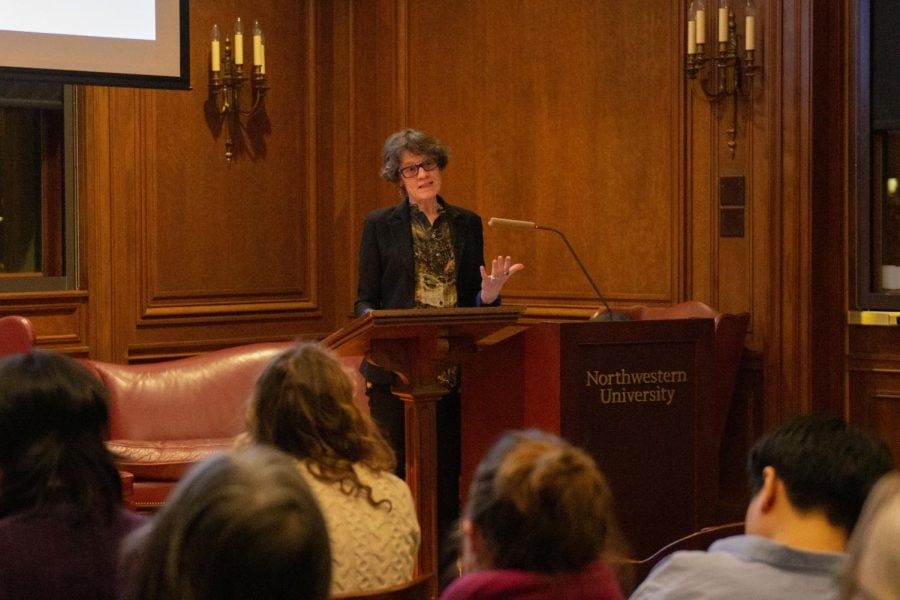Author Leslie J. Reagan talks abortion history, post-Roe reality
Lexi Goldstein/The Daily Northwestern
Leslie J. Reagan’s book “When Abortion Was a Crime: Women, Medicine, and Law in the United States, 1867-1973” focuses on how the concept of abortion and public reception to the practice has changed.
February 3, 2023
Author and University of Illinois Urbana-Champaign Prof. Leslie J. Reagan discussed abortion history and reproductive rights in the United States at a Thursday event.
Throughout the talk, Reagan frequently cited the U.S. Supreme Court’s Dobbs v. Jackson Women’s Health Organization ruling, which overturned the landmark case Roe v. Wade last June.
“Destroying Roe and criminalizing abortion hurts all of us,” Reagan said. “We tend to think in the way it’s covered that it really is only a few people who need abortions, or it’s only women. It really is much larger than that.”
Reagan added that she was disheartened by the Dobbs decision and the false information she and other scholars identified within it.
She and other historians view the decision’s statement that the U.S. traditionally prohibited abortion “on pain of criminal punishment” prior to 1973 as incorrect, she said.
“The fact that it is in a Supreme Court opinion that is now the law of the land makes it clear that evidence in making decisions and historical evidence doesn’t matter,” Reagan said.
Reagan also emphasized how Roe v. Wade set legal precedent for other federal cases, including Lawrence v. Texas and Obergefell v. Hodges. Women are primarily affected by a lack of abortion access, she said, and many more are impacted by court cases centered on issues of bodily autonomy and privacy.
However, Roe v. Wade is not to be idealized, Reagan said, as the U.S. Supreme Court’s original 1973 decision did not guarantee abortion access or address inequities in reproductive healthcare.
Reagan’s book, “When Abortion Was a Crime: Women, Medicine, and Law in the United States, 1867-1973,” focuses on how the concept of abortion and public reception to the practice has evolved over time.
Abortion began as a practice of “restoring the menses,” she said, and eventually became a commercialized, pharmaceutical offering. Abortion became another form of birth control and was fairly normalized until the 20th century, she added.
In the 1950s, abortion was policed at higher rates and raids of medical spaces became more frequent as the practice was considered a crime in some states.
“There is no way to prosecute or try to eliminate abortion without also going after women,” Reagan said.
She also said the majority of people in America say abortion should be legal in all or most cases.
Moving forward, Reagan said she hopes people will continue to advocate for more safe abortion access. She cited SisterSong, an Atlanta-based reproductive justice movement aiming to amplify the voices of women of color, as an effective grassroots movement.
History Prof. Tessie Liu helped plan the event, which was organized by the Gender & Sexuality Studies Program and co-sponsored by the Women’s Center.
“What I was really happy about is that there (were) so many people in this room and people really asked great questions,” Liu said. “I hope the engagement continues.”
The audience asked Reagan questions on policing of abortion and reproductive health laws in Illinois following her presentation.
Weinberg freshman Evgeny Stolyarov said he attended the event to learn more about the social history of abortion access.
“Just because you were told that something was the way it (was), and just because you think something has always been the way it is now, does not mean that it always was that way,” Stolyarov said.
Email: lexigoldstein2026@u.northwestern.edu
Twitter: @lexipgoldstein
Related Stories:
— History Prof. Kate Masur discusses new course on abortion history in post-Roe world
— Gender and Sexuality Studies Program talks past, present and future of abortion rights



